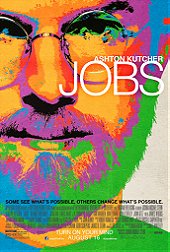By most accounts, Apple founder Steve Jobs was a cruel person; a narcissist who acted callously towards his family, friends and subordinates. However, according to Joshua Michael Stern's Jobs, all of the innovator's undeniable shortcomings are forgivable because he was a saint who simply used severe means in his quest for perfection. Even though this movie was not endorsed by Apple, it plays out like a safe commercial for the tech giant, with the screenplay by Matt Whiteley demonstrating no interest in exploring the psychological or behavioural complexity of its titular character. Jobs feels like a surface-level made-for-television movie, never transforming into anything substantive. It's a serviceable experience, but it lacks the ingenuity, execution, thematic heft and lasting impact of David Fincher's The Social Network, the film that Jobs clearly wants to emulate.

Dropping out of college due to boredom, Steve Jobs (Ashton Kutcher) begins sitting in on design classes on-campus, studying calligraphy which stimulates his imagination. Jobs eventually lands a job at Atari, where he recruits his tech-savvy pal Steve Wozniak (Josh Gad) to assist in developing hardware. Finding that Wozniak has developed a device that could revolutionise home computing, Jobs pairs up with his friend, going into business together and founding Apple Computers, hoping to sell their technology to anyone brave enough to buy it. Getting his big break thanks to investor Mike Markkula (Dermot Mulroney), Jobs develops Apple into an industry force to be reckoned with, developing innovative products to remain ahead of their competition. However, power plays and financial demands force Jobs out of his own company, though he eventually returns years later with a vision to re-energise the fading Apple brand.
Jobs follows the standard biopic template, providing a "greatest hits" compilation of major events in Steve Jobs' life and Apple's tumultuous development. Since Stern and Whiteley strive to cover as much ground as possible, they fail to give any one subplot the dramatic development that it deserves, leading to story threads that lead absolutely nowhere. For instance, Jobs has a very heated phone call with Bill Gates regarding Microsoft and threatens to sue, but nothing more stems from this. Likewise, Jobs throws out his girlfriend due to an unwanted pregnancy, and refuses to accept that the child is his. In the third act, suddenly, the disowned daughter is in Steve's custody without any explanation as to why he finally embraced his little girl. At the very least, however, the film is fairly successful in its early stages, providing an absorbing glimpse at the early development of Apple in the 1970s. A two-hour film could have been produced which zeroed in on the early days alone, but the film wants to chronicle a lot more, resulting in a disjointed mishmash of dramatic skits without a proper through-line. Jobs is ambitious, but it fails to sufficiently delve into who Steve Jobs is and what makes him tick.

One of the fatal flaws of Jobs is that it decides for us that being a technological innovator is a good excuse for being a repellent human. It's the adulation that Stern and Whiteley display towards Jobs that renders the movie infinitely less interesting than it had the potential to be. Whereas The Social Network had the intelligence to present an honest, insightful, morally ambiguous portrayal of its subject matter and let us draw our own conclusions, Jobs is much less sophisticated. Worse, the ending is a total dud; it closes on an empty, underwhelming note, destined to induce murmurs of "Is that it?" Rather than a meaningful conclusion that effectively wraps everything up, the flick just seems to cut itself off right after Jobs gets back the reigns to his company which ultimately leads them to where they are today. A detailed segment about Apple's rise to prominence in the 21st Century would have been interesting, or the film could have even closed with a short, poignant montage depicting Jobs' more recent innovations leading up to his death. If such material was tagged onto the end, movie-goers would leave the cinema with interesting material to ponder. In its current form, you'll just shrug.
If nothing else, Jobs can be admired for its technical credits. Putting the tiny $12 million budget to good use, Stern convincingly recreates the '70s, '80s and '90s, with period-specific costumes and make-up, supplemented with a pleasant soundtrack of recognisable songs. With that said, though, Stern is not much of a visual stylist. Fincher's The Social Network was much more involving, and its pace was brisker, but Jobs is extremely middle-of-the-road all the way through, only rarely gaining much traction. Luckily, the acting all-round is strong for the most part. Kutcher is a fine, if not exactly memorable, Steve Jobs. He even emulates his distinctive walk, a fact that Stern is all too happy to exploit - maybe 10% of the film consists of shots of Kutcher just walking.

Ultimately, the story of Jobs and Apple is wasted in this distilled two-hour motion picture; there is easily enough fodder for a television miniseries that could provide the definitive overview of this subject and incisively explore more than just the surface of this complex man. Watching Jobs is akin to reading a Wikipedia entry due to its lack of depth and detail. For those curious about the life of Steve Jobs or the growth of Apple, the movie may be serviceable enough. By no means is this a terrible movie; it's just a missed opportunity, playing out like a Lifetime Original production as opposed to an audacious theatrical feature.
5.2/10
 Login
Login